“I am an Arab,
You stole my forefather’s groves and the land I used to till,
I and all my children; and you left us nothing but these rocks,
for us and all my grandchildren.
Yet, will your government take them too, as is being said?”
(Mahmoud Darwish, Palestinian Poet)
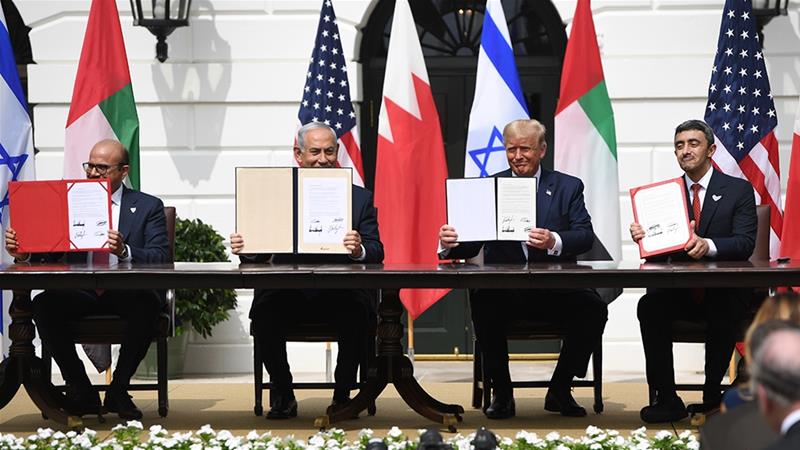
On September 15, 2020, Israeli Prime Minister Benjamin Netanyahu signed peace agreements with the UAE and Bahrain. According to these deals, these Arab nations will establish embassies, exchange ambassadors, cooperate and work together with Israel. In this US brokered event, Israel signed separate agreements with each of the Gulf States and the US joined all three in signing a common document known as the Abraham Accords.
While the White House described the deal as a “declaration of peace”, detractors call it an arms deal dressed up as peace accord. President Trump said he expected more Arab nations to follow suit and predicted that the Palestinians would eventually join as well or else be “left out in the cold”. Incidentally, these accords might shore up support for President Trump among Jewish and pro-Israel Christian evangelical voters in the US in the upcoming Presidential election.
Now, what is the implication of these deals for the Palestinians – the massive number of people who had to flee their homes and become refugees in their own land in the aftermath of the establishment of the State of Israel and the consequent Arab-Israeli Wars? This article seeks to trace the history of the Palestinian problem to discover how it all started and how the situation has been turning increasingly painful for the Palestinians:
Although the Israelis claim Palestine as their homeland, history does not seem to support such a view. Abraham, the Jewish Patriarch considered the father of monotheism, had lived in Mesopotamia (present day Iraq). According to the Jewish Scripture (the Old Testament part of the Christian Bible), Jehovah, the Jewish monotheistic deity, commanded Abraham to leave his family and go to Canaan (present day Israel and nearby territories). God promised the land as inheritance to him and his descendants. Thus, Canaan (Palestine) became the ‘Promised Land’ of the descendants of Abraham. Then not only Jews, but also Christians and Muslims claim the ancestry of Abraham!
According to the Jewish Scripture (Tanakh) Abraham moved in to Canaan some 3800 years ago. The Canaanite tribes accepted him into their community. His grandson Jacob (whom God named Israel) had twelve sons. (These sons of Jacob are the heads of the twelve tribes of Israel). Joseph, his eleventh son, was sold off as a slave by his elder siblings who envied him because he was the beloved of his father. His buyers took Joseph to Egypt, where he eventually became a senior functionary in the Egyptian administration. In the face of a severe famine, Jacob and his family migrated from Canaan to Egypt. The influence Joseph had with Pharaoh ensured their confortable settlement in Egypt.
The children of Jacob alias Israel (the Israelites) lived in Egypt for long and multiplied. They eventually became slaves in Egypt. God chose Moses to release the Israelites from Egyptian bondage. After suffering a series of plagues, Pharaoh set the Israelites free. According to the Jewish scripture, around twenty lakh people led by Moses entered the Sinai Desert some 3300 years ago for a tedious journey to Canaan, their ‘Promised Land’. For forty long years, the Israelites wandered in the Sinai Desert. A substantial part of the population perished in the desert. Moses too died without setting foot on the Promised Land.
The Israelite army led by Joshua, a bold and brutal warrior, entered Canaan to conquer the ‘Promised Land’. The sword of Joshua stole the peace of the land forever. Bloody and devastating battles followed. The Israelites burned down cities and annihilated everything that breathed. The invaders too suffered big reverses and casualties. The war started by Joshua continues even to this date. The Israelites managed to conquer a substantial extent of territories in Canaan. They established the Kingdom of Israel and anointed Saul as their first king. Israel remained united and powerful during the reigns of his successors King David and his son King Solomon. King Solomon built a massive and magnificent temple for Jehovah on the Temple Mount in Jerusalem, the capital of Israel, some 3000 years ago.
After King Solomon, internal dissentions led to the splitting of the Jewish kingdom into two nations – Israel (Northern Kingdom) and Judah (Southern Kingdom). In 721 BCE, the Assyrian army captured the Israelite capital Samaria and carried away the citizens of Israel into captivity. The ten Israeli tribes that had lived in Israel were either massacred or dispersed and eventually faded away. They came to be called the ‘Ten Lost Tribes of Israel’. The Kingdom of Judah in which the remaining two tribes lived was attacked by the Babylonian king Nebuchadnezzar in 597 BCE. His army destroyed the Jerusalem Temple and the Holy City. Nebuchadnezzar led away a most of the Jewish population to Babylon, where they lived in exile for six to seven decades.
In 539 BCE, the Persian king Cyrus conquered Babylon, the ancient capital of the Babylonian Empire that covered today’s Iraq, Syria, Lebanon and Israel. King Cyrus allowed the Jews to return home. The Jews who came back from exile built the Second Temple in Jerusalem on the ruins of the First Temple. But the Jewish nation remained part of the Persian Empire. Except for around a hundred years in between, when the Hasmonean Dynasty ruled it, the Jewish Promised Land remained under non-Jewish rule until the formation of the modern State of Israel in May, 1948.
Roman general Pompey conquered Jerusalem in 63 BCE and deposed the ruling Hasmonean dynasty. The Roman Senate declared Herod the Great “King of the Jews” in c. 40 BCE. Mounting Jewish–Roman tensions led to the first major clash between the two sides – the First Jewish–Roman War also called the Great Revolt (66 CE – 73 CE). In 70 CE, the Romans destroyed the Jerusalem Temple (Second Temple). The flow of Jews out of their land under Roman rule steadily increased. The second Jewish Revolt (‘Bar Kokhba Revolt’) erupted in 132 CE and continued for four years. In the end, the Romans wiped out most of the Jewish population of central Judaea (Roman Judah). The Jews were killed, sold into slavery or forced to flee.
In the aftermath of the ‘Bar Kokhba Revolt’, Jerusalem was converted into a Roman colony. The city was renamed ‘Aelia Capitolina’. Jews were banned from entering their holy city except on the day of Tisha B’Av (the Jewish day of fasting commemorating the destruction of the temples in Jerusalem). Judea and Samaria were renamed by Roman Emperor Hadrian as Syria Palaestina. Thus, the territory eventually came to be called Palestine. In the aftermath of the Second Jewish Revolt, almost the entire Jewish population became permanently exiled in the diaspora.
The existence of the Jews in the diaspora was also threatened by the two new religions (Christianity and Islam) that emerged subsequently, claiming the ancestry of the Hebrew Patriarch Abraham. Christianity originated in the first century and Islam in the seventh century. The Jewish roots of Christianity are traced through the ancestry of Jesus, a Jew. Islam originated in Mecca and Medina at the start of the 7th century. Islam traces it link to Abraham through his son Ishmael. Prophet Muhammad, the founder of Islam, died in 632. Islam spread as Muslims started conquering nations across the world. By 8th century, the Islamic empire extended from Iberia in the west to the Indus River in the east.
As Christianity and Islam spread quickly across nations and the political control of many nations, solely or jointly with the Kings/Emperors/Emirs/Sultans etc., came into the hands of the leaders of the faith – Popes/Patriarchs/Caliphs/Muftis etc., the plight of the Jews kept worsening. Both Christianity and Islam hated the Jews – Christians apparently in a greater degree than Muslims. Gradually, the Jew came to be racially ostracised and persecuted under Christian and Islamic regimes.
In the fourth century CE, Christianity became the official religion of the Roman Empire. Remember that the Roman Empire then covered almost the entire known world. When Roman Emperor Constantine converted to the Christian faith, he changed Jerusalem into a Christian centre. For the next three hundred odd years, the holy city of the Jews remained under the control of the Christians. Under Christian rule, Jews were not allowed to live in Jerusalem.
Jerusalem was captured by Islamic rulers in 638 CE. Jews were allowed to return to Jerusalem. However, since Temple Mount, the Holy site of the Jewish Temple, was sacred for the Muslims too, they constructed Islamic shrines on the Temple Mount on the ruins of the Jewish Temple. In 1099 CE, the Christian Crusaders expelled the Muslims and recaptured Jerusalem. When Jerusalem returned to Christian control, they killed or evicted both Jews and Muslims.
The Ottoman Turks captured Palestine and Syria in 1516. For the next four hundred years, the Holy Land of Jews, Christians and Muslims, remained under Islamic reign. While Christianity and Islam fought bloody battles for control over the Jewish homeland, the Jews continued to drift all over the world, without a nation of their own and under constant attack and persecution by the adherents of other Abrahamic religions. “…for the living, the Jew was a dead man; for the natives, an alien and vagrant; for property holders, a beggar; for the poor, an exploiter and a millionaire; for the patriot a man without a country”, (Leon Pinsker, as quoted by Karen Armstrong in her book ‘Holy Wars’).
Considerable demographic changes happened during the 19th century. Druze, Circassians and Bedouin tribes were migrating to Palestine. The emergence of Zionism also brought waves of Jewish immigrants from Europe into Palestine.
During World War I (1914-1918) the British government issued the Balfour Declaration of 1917, which favoured the establishment of national home for the Jewish people in Palestine. The British captured Jerusalem from the Ottomans a month later. The League of Nations formally awarded Britain a mandate over Palestine in 1922, allowing the British to rule the territory temporarily. In the meanwhile anti-Semitism (Jew hatred) was rising and the diaspora was desperate to have a nation of their own in their ‘Promised Land’. The violence against Jews peeked during the World War II (1939-1945) when Nazi Germany under Adolf Hitler started executing the ‘Final Solution’ to the Jewish question. Some six million Jews were massacred in the ‘Holocaust’.
The Nazi insanity that caused the Holocaust accelerated the flow of the diaspora into Palestine both legally and illegally, openly and clandestinely. Continuous Jewish immigration into Palestine and British colonial rule led to sectarian violence between Jews and Arabs. The United Nations General Assembly voted to partition Palestine into independent Arab and Jewish states (The Two Nation Solution). The Arabs rejected the Partition Plan while the Jews ostensibly accepted it.
On May 14, 1948, General Alan Cunningham, the last British High Commissioner, took leave of what was known then as the British Mandate of Palestine. “The Union Jack was lowered and with the speed of an execution and the silence of a ship that passes in the night, British rule in Palestine came to an end”. The last British soldiers went on board the last British vessels moving out of the port of Haifa. Some eight hours before the midnight of May 14-15, 1948, when the mandate was ending, the Jewish People’s Council had assembled at the Tel Aviv Museum, where David Ben-Gurion proclaimed the establishment of a Jewish state in the Land of Israel (Eretz-Yisra’el), to be known as the State of Israel. U S President Harry S Truman and Soviet leader Joseph Stalin forthwith recognized the new nation.
The Arab League members that had rejected the UN partition plan were resolved to exterminate the Zionist venture of a Jewish state in the midst of Arab nations. On May 15, 1948, the day after the State of Israel came into existence, the armies of a military coalition of Arab states attacked the fledgling Israel. It set off the First Arab-Israeli War. Israelis and their supporters have traditionally referred to this conflict as the ‘War of Independence’.
Hardly anyone expected Israel to win the war. But the Arab Goliath could not drive the Israeli David into the Mediterranean Sea. Israel not only prevailed but also conquered far more territory of the Mandate than envisioned in the UN Partition Plan. During the war, 700,000, or about 80% of all Palestinians fled or were driven out of the territory that Israel conquered. This event became known as the Nakba (“Catastrophe”) to the Palestinians. This started the Palestinian Problem – the disaster of a population turning refugees in their own land.
After the First Arab-Israel war, only two regions of Palestine remained under Arab control: the West Bank (and East-Jerusalem), annexed by Jordan and the Gaza Strip (occupied by Egypt). These territories too were captured by Israel during the Six-Day War in 1967. Despite international objections, Israel started to establish settlements in these occupied territories. The Palestinian refugees occupied in the West Bank and Gaza.
The Palestine Liberation Organization (PLO) was founded in 1965 under the leadership of Yasser Arafat to fight for the cause of the Palestinians. The Palestinian national movement gradually gained international recognition. In 1993, the Oslo Peace Accords between Israel and the PLO established the Palestinian National Authority (PA) as an interim body to run parts of Gaza and the West Bank pending a final solution to the conflict. In 2004, Israel withdrew all settlers and most of the military presence from the Gaza strip, but maintained control of the air space and coast.
After 70 long years, a final solution to the Palestinian Problem is becoming increasingly impossible, considering the shifting loyalties and internal rivalries within the Palestinian leadership. The Palestinian Authority of Fatah party administers the Palestinian West Bank. Gaza is ruled by Hamas. Fatah and Hams do not see eye to eye and are fighting each other. This Palestinian disunity makes matters easier for Israel.
Gaza is a vast ghetto – overcrowded and impoverished. Here, in this tiny space, devoid of resources, wholly dependent on foreign aid, blockaded on all sides, almost two million Palestinian men, women, and children are corralled and contained. And seventy per cent of them live below the poverty line. Hamas has little time or interest for the welfare of the people under its rule. Palestinians have no army, navy or air force! Yet Hamas is determined to destroy Israel using clandestinely acquired missiles and locally made Molotov cocktails!
Israel continues to build more and more Jewish settlements in the West Bank. Since June 2002, Israel has been constructing a wall in the West Bank that stretches some 700 kilometers. This ‘apartheid wall’, increasingly curtails the freedom of movement of the Palestinian in the West Bank, already limited and controlled by a system of checkpoints and road restrictions. The West Bank wall constantly tells Palestinians that they are all terrorists, an untrustworthy lot, who need to be confined, controlled and kept under constant surveillance. ‘The wall is a constrictor that crushes Palestinian space, mind and body’. (T M Krishna, thewire.in, Mar 18, 2017).
The human tragedy in Palestine is real, although it is no more headline news in the international media. In 1958, Ralph Galloway, former United Nations Relief and Works Agency for Palestine Refugees (UNRWA) director wrote, “Arab leaders do not give a damn whether Arab refugees live or die.” This is being proven true by their actions. And the Jews seem to have conveniently forgotten forever, their lives not long ago in the Polish ghettos and Nazi concentration camps. This is not to suggest that all Jews are against Palestinians. There are Jews, who are genuinely concerned about the suffering of the Palestinians. They are helpless against a brute right-wing majority.
Egypt had led the Arab League armies in the wars against Israel. And it was the first Arab nation to sign a peace pact with Israel in 1979. Of course, Egyptian President Anwar Sadat, who signed the Camp David Accords and the subsequent peace agreement with Israel, had to pay the price for it with his own life. President Sadat was assassinated by Islamic extremists during the annual victory parade held in Cairo on October 6, 1981, to celebrate Egypt’s crossing of the Suez Canal during the 1973 Arab–Israeli War.
Then extremism is not confined to any one side of the divide. Israeli Prime Minister Yitzhak Rabin, who had signed the Oslo Accords 1993 with PLO Chairman Yasser Arafat, too suffered the same fate. Rabin was killed on November 4, 1995, by a 25-year-old Israeli law student, Yigal Amir, while participating in an anti-violence rally organized in support of the Oslo peace process in Tel Aviv. Peace is not an option for many on both sides.
Jordan signed a peace pact with Israel in 1994. Now, over a quarter century later, two more Arab nations have agreed to normalize relationship with Israel. More Arab nations might come on board. Iran is the only nation that has raised objections openly. But that is understandable because of the Sunni-Shia enmity. Iran is a Shia nation whereas most Arab nations including Saudi Arabia are predominantly Sunni. And everyone knows which side of the bread is buttered!
In the wake of the latest accords, Israel has suspended its intended annexation of parts of the West Bank. But it is unclear how long the suspension lasts. It is also unclear whether the ‘two-state solution’ is still possible to bring an end to the Israeli-Palestinian conflict. Palestinians were hoping to make Jerusalem their capital. But that is certainly not happening after the United States formally recognized Jerusalem as the capital of Israel on December 6, 2017. West Bank is ancient Judah of King David. The Jews might not give it up easily. The list of options available to the Palestinians is shrinking.
The Palestinians have been pushed to the wall. There is apparently no glimmer of light at the end of the tunnel for the Palestinians.


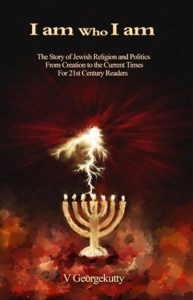




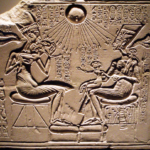
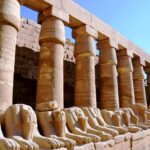
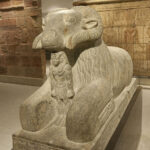

ഒരു ഇസ്ലാം മത വിശ്വാസിക്ക് ജൂതരെ അംഗീകരിക്കുവാൻ പറ്റുകയില്ല. അത് ഖുറാൻ്റെ വെളിച്ചത്തിലാണ് പറയുന്നതു്.
Can a Jew accept a Muslim? In any case, that is not the issue I was trying to discuss. My concern is human suffering. I do not think it Christian to ignore human suffering in the name of faith. It is time we stopped persecuting and killing people in the name of religion.
Thanks.
George kutty